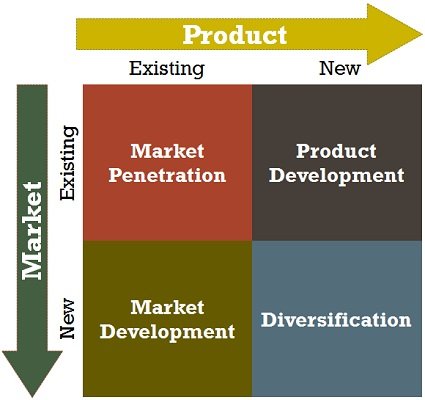Ansoff Matrix for Growth - My startup journey / part 14
If you are starting a business (IT or any other startup) in the time you reach out a product (not before the beta version) you will need a strategy for GROWTH.
Growth is the most important factor for startups. I even call this an aggressive fact that sometimes people not familiar with the startup ecosystem wonder how this growth hunger leaves them sustainable. anyway, I will discuss this later, but now, I want to talk about one of the techniques to achieve such growth in market space:
Ansoff Matrix
Among business analysis techniques, Ansoff Matrix provides a framework enabling startup owners to spot growth opportunities. It can help you consider the implications of growing the business through existing or new products and in existing or new markets. Each of these growth options draws both internal and external influences.

Ansoff Matrix goes through a SWOT analysis in your business environment. a SWOT analysis in simple words studies your business strengths, weaknesses, opportunities, and threats. These parameters should relate each other in business competition or project planning your are practicing.
The usefulness of both the SWOT analysis and Ansoff Matrix depends on the quality and accuracy of the market intelligence they are based on. this information is best supplied by entrepreneurs who can provide accurate and up to date data on their consumers, customers and competitors.

The sequence of strategies:
- Market Penetration (I have discussed this before here) - command: simply focus on selling more to grow more.
- Market Development - command: focus on developing new markets or market segments for your existing products or services
- Product Development - command: focus on developing new products or services for existing markets
- Diversification - command: focus on the development of new products to sell in new markets

Example
My own business example: when I was running my ISP, the strategy was absolute market penetration. more internet accounts would bring us more profit margin. It is just about a milky cow and the overhead costs. once you covered those costs, the cows will be profitable on a linear growth index.
but in our RFID startup which I explained earlier in my previous posts, Product Development was exactly the answer. because the market had the potential to give us a better share, but our products needed a change and we developed our product/service to answer new needs.
If you are in a mature market, you may need to do some disruptions. this brings the Diversification up. without enough innovation and sometimes enough funds, it would be very risky to step in to Diversification. it will swallow your resources and usually takes time and patience to pay off.
Market development case:
I started irxp.com back in 2005. it was a B2B platform for int'l companies who are interested in Iranian marketplace, with more embargo and sanctions from US imposed to Iran's economy, we decided to go to south east Asia and develop our market. this process is still continuing as a new experience for me. and I can tell you, though Diversification may sound the most risky strategy, Market Dev is the most tricky one for small-medium size businesses. having a lot of challenges in new regulations, culture, business habits etc.
Image sources:
- the ansoff matrix source
- the marketing strategist! source
- the Ansoff 4 sequence image and information: http://www.free-management-ebooks.com/
You got a 71.99% upvote from @upme thanks to @honarparvar! Send at least 3 SBD or 3 STEEM to get upvote for next round. Delegate STEEM POWER and start earning 100% from your share, daily payouts ( no commission ).
Quick delegation links: 25SP | 50SP | 100SP | 250SP | 500SP | 1000SP | 2000SP | 5000SP | Custom Amount